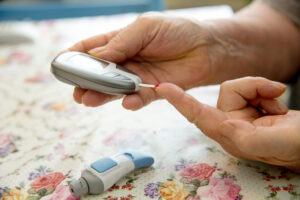Ask Mr. Pedometer and Friends…About Diabetes Symptoms
Q: Mr. Pedometer, how is it possible that a person could have Type 2 diabetes and not be aware of it?
A: Good question, particularly since November is Diabetes Awareness Month. Here’s what Everyday Health has to say about how Type 2 diabetes symptoms may be hard to recognize:
“Signs of diabetes include frequent urination, fatigue, and sudden weight loss…. It’s not always easy to recognize signs of Type 2 Diabetes, especially because symptoms can develop slowly — or be mistaken for something else.
“For example, increased thirst may be chalked up to a hot summer, or fatigue may be interpreted as a sign of aging or stress. This is unfortunate, as even short-term high blood sugar (hyperglycemia) diminishes your quality of life.
“’High blood sugar means that there is an accumulation of glucose in  the blood that is not reaching its given destination in the body,’ says Monet Bland, CDE, at the Joslin Diabetes Center in Boston. ‘Untreated hyperglycemia can lead to skin problems, gynecological problems, impotence, fatigue, and blurred vision.’
the blood that is not reaching its given destination in the body,’ says Monet Bland, CDE, at the Joslin Diabetes Center in Boston. ‘Untreated hyperglycemia can lead to skin problems, gynecological problems, impotence, fatigue, and blurred vision.’
“And if high blood sugar stemming from diabetes persists for a long time, you may eventually develop complications, such as vision problems (diabetic retinopathy), nerve damage (diabetic neuropathy), or kidney disease (diabetic nephropathy) that cannot be completely reversed with improved blood sugar control.
“’It is important to note that often times the complications of diabetes can be worse than the diabetes itself,” Bland says. To help prevent high blood sugar, Bland says, you can monitor your food intake by:
Keeping portion sizes in mind – Limit food portions and track your caloric intake to make sure you are not consuming too many calories for your energy needs.
- Considering your diet choices – Carbohydrates have the largest effect on blood glucose, so you should track your intake and reach for complex carbs that are lower on the glycemic index, Bland says.
- Incorporating exercise – Exercise is known to lower blood glucose.
“Type 2 diabetes can cause a wide range of signs and symptoms, including:
- Fatigue even when you’ve slept well
- Dry mouth
- Extreme thirst
- Cloudy thinking
- Irritability
- Wounds that won’t heal
- Frequent yeast infections
- Blurry vision
- Sleeping troubles
- Excessive urination
- Sexual problems
- Sudden and unexpected weight loss
(Source: www.everydathealth.com )
These are good reasons why Mr. Pedometer always signs off by saying…